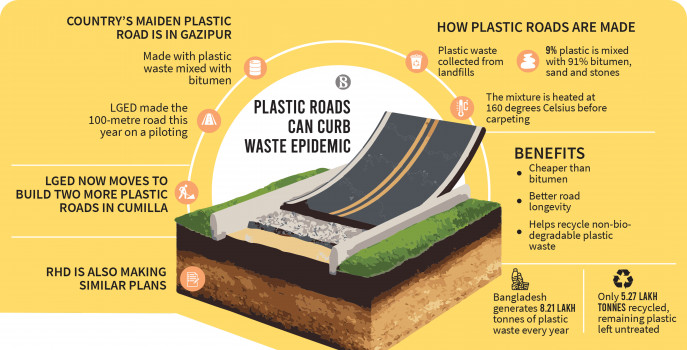Important Facts For Prelims
Bio-Bitumen
- 25 Jun 2024
- 5 min read
Why in News?
Recently, India has embarked on plans to initiate large-scale production of bio-bitumen from biomass or agricultural waste.
What is Bio-Bitumen?
- About:
- Bio-bitumen is a bio-based binder derived from renewable sources like vegetable oils, crop stubble, algae, lignin (a component of wood), or even animal manure.
- Origin and Production: Bitumen is primarily derived from the distillation of crude oil. During refining, the heavier bitumen remains after lighter components like gasoline and diesel are removed. It can also naturally occur in deposits, such as in oil sands.
- Properties and Uses of Bitumen:
- It is known for its waterproofing and adhesive properties and is extensively used in road construction (asphalt paving) and waterproofing applications in buildings and marine structures.
- Bio-bitumen can be Used in Various Ways:
- Direct Replacement: Completely replacing petroleum bitumen with bio-binder in asphalt.
- Modifier: Adding bio-materials to traditional bitumen to improve its properties.
- Rejuvenator: Restoring the elasticity and functionality of aged asphalt pavements.
- Current Bitumen Scenario in India:
- Import Dependency: India currently imports approximately half of its annual bitumen requirement, amounting to 3.21 million tonnes in the fiscal year 2023-24.
- Domestic Production: Indigenous bitumen production stood at 5.24 million tonnes during the same period.
- Increasing Consumption: Bitumen consumption has risen steadily, averaging 7.7 million tonnes annually over the past five years.
- Construction of national highways (NH) touched around 12,300 km in 2023-24 which is almost 34 km per day.
- Objectives of Bio-Bitumen Production Initiative:
- Reducing Import Dependency: The primary objective is to replace imported bitumen with domestically produced bio-bitumen over the next decade, thereby reducing foreign exchange expenditure.
- Addressing Environmental Concerns: Bio-bitumen production aims to mitigate environmental issues associated with stubble burning by utilising biomass and agricultural waste as feedstocks.
- Promoting Sustainable Practices: By leveraging bio-based materials, the initiative supports sustainable road construction practices and aligns with global environmental standards.
- Technological Development and Pilot Study: The Central Road Research Institute (CRRI) is collaborating with the Indian Institute of Petroleum to conduct a pilot study on a 1-km road stretch using bio-bitumen.
- Challenges:
- Cost-Effectiveness: Currently, bio-bitumen production can be more expensive than traditional methods.
- Long-Term Performance: More extensive field trials are needed to assess the long-term performance and durability of bio-asphalt compared to traditional pavements.
- Standardisation: Establishing clear standards and specifications for bio-bitumen is necessary for its wider adoption in the construction industry.
Other Innovation Methods in Road Construction
- Steel slag road technology is a novel method of using steel slag, the waste generated during steel production, to build more robust and more durable roads.
- For example, Steel Slag Road technology was first used in Surat.
- In Hamburg, Germany, companies developed 100% recycled asphalt pavement (RAP) to meet reduce costs, save energy, and lower carbon emissions.
- India has built more than 2,500 km of plastic roads and globally too, plastic roads are proliferating in more than 15 countries.
- For example, it is mandatory to make use of at least 10% of plastic waste for road construction in Ladakh.
UPSC Civil Services Examination, Previous Year Question (PYQ)
Prelims:
Q. In rural road construction, the use of which of the following is preferred for ensuring environmental sustainability or to reduce carbon footprint? (2020)
1. Copper slag
2. Cold mix asphalt technology
3. Geotextiles
4. Hot mix asphalt technology
5. Portland cement
Select the correct answer using the code given below:
(a) 1, 2 and 3 only
(b) 2, 3 and 4 only
(c) 4 and 5 only
(d) 1 and 5 only
Ans: (a)
Q. In the Union Budget 2011-12, a full exemption from the basic customs duty was extended to bio-based asphalt (bioasphalt). What is the importance of this material? (2011)
1. Unlike traditional asphalt, bio-asphalt is not based on fossil fuels.
2. Bioasphalt can be made from non-renewable resources.
3. Bioasphalt can be made from organic waste materials.
4. It is eco-friendly to use bioasphalt for surfacing of the roads.
Which of the statements given above are correct?
(a) 1, 2 and 3 only
(b) 1, 3 and 4 only
(c) 2 and 4 only
(d) 1, 2, 3 and 4
Ans: (b)





